Editor’s Note: Retired Santee firefighter Dana Ben Kaplan served in Israel immediately following the October 7th massacre perpetrated by Hamas. Last December, he wrote about the first tumultuous week he experienced in the war, and in this article he reconstructs the second week.
By Dana Ben Kaplan
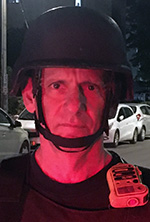
RISHON LEZION, Israel — The air war against Hamas in Gaza had started, and we began experiencing sirens at our station in the north, meaning a dash into the safe room (which was the station’s synagogue as well) because of attacks which were more likely coming from Hezbollah in Lebanon.
I WhatsApped our EVP (Emergency Volunteers Project) liaison: “There’s no way I would leave Israel now. My family and friends are drafted. Please find a place for me.” It might have been a lot to ask, but they told me to contact the US representative for EVP for approval, and they all ended up accommodating me. My fellow two American firefighters (Arizona and Texas) and I said our goodbyes to the station crew in Nof HaGalil, and we loaded our gear as our ride arrived. This consisted of our firefighter “red bags” containing all of our protective gear – turnout coat / pants, bunker boots, fire helmet, gloves, and for me, being from Southern California, light brush pants / jacket; along with our Israeli-issued heavy Kevlar helmet and flak vest. We drove south for about 1.5 hours, skirting along the line bordering Samaria (Shomron), passing Israeli villages, both Arab and Jewish. Everything was heading south, in preparation for the ground invasion of Gaza which everyone knew was coming. We passed many of Israel’s awesome Merkava tanks on low bed trailers. What I found interesting was that at each bus stop, volunteer civilians, ordinary Israelis, had set up tables and were handing out food and drinks to soldiers. We saw cars of civilians cheering the soldiers as they drove past them. But you could feel it in the air – the war was about to change, intensify. And what had been 24 / 7 no-commercial coverage on every Israeli TV channel of stories of the October 7 massacre in the south, and interviews with survivors and families of hostages, would soon transition to reports of those who fell in battle.
Since I had made arrangements with EVP to stay a second week (I was technically on a training deployment when I arrived, which normally last about one week), they had to find a place for me. So I was dropped off to be the sole American firefighter at the large, older Rishon LeZion fire station, and my fellow firefighters continued on to the nearby Israel National Fire and Rescue Academy in preparation for their ride to the airport to fly home (on El Al, as every other airline had cancelled all flights into and out of Israel).
Soon after I arrived, we started running on so many incidents I lost track of the days. We regularly ran to our safe room (mamad) in the fire station, day and night. What follows is a partial journal.
Monday 16 October – I thought it was a rocket strike, as there was heavy black smoke showing from several places around the ground floor of the multistory residential building upon arrival, but it turned out to be a fire in the underground garage. My company commander wasn’t taking any chances of losing an American firefighter, so he grabbed and held my coat sleeve as we advanced into the darkness, with zero visibility, until we reached the flames at the seat of the fire. Not a rocket, just a storage room.
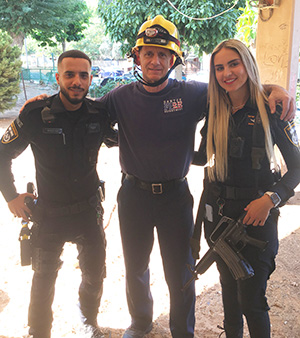
Tuesday 17 October – Response to an odor of gas. An outdoor propane gas canister was leaking, as we determined with our gas detector. Two police officers arrive, one of whom I speak with, a young lady of 19. She is doing her national service instead of the army – I had not previously met Jewish Israelis who had chosen this option. She’s carrying an M4 automatic assault rifle.
Wednesday 18 October – We staged on the side of the closed highway for President Biden’s convoy (which was what I’ll call “dozens and dozens” of vehicles, including several decoys) as he returned to Ben Gurion airport after his quick visit to meet with the prime minister. Israelis were very appreciative of the gesture. Of course, the terrorists didn’t launch any rockets while he was there, to avoid creating any sympathy for Israel; terrorists resumed fire immediately after Air Force One departed.
Hearing our emergency calls announced over the station speaker, I’d run out to the fire engine and ask the commander what gear I needed to wear: red visibility vest, if there was no need for protective gear; turnouts, for a fire / rocket strike; or flak jacket and Kevlar helmet, for a rocket interception (kipat barzel, iron dome).
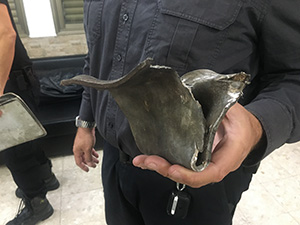
Thursday 19 October – We’re responding to a common call – kipat barzel interception – so we’re told to wear “flaks and Kevlars.” After parking the engine, we move quickly as a group toward the home which has been hit; it’s us firefighters, police, ambulance personnel (Magen David Adom), and IDF Homefront Command. Needless to say, as we enter, we overwhelm the residents of the apartment. We’re inspecting the hole made in the roof and ceiling from the terrorist rocket (these are made of steel, constructed from water pipes which Hamas has dug up, originally intended to supply drinking water to Palestinians in Gaza). But then a siren alerts us to more incoming rockets. I have my phone with me so I video our descent into the stairwell under the house – there are too many of us to squeeze into their mamad. Soon we leave, and get back in the fire engine for the trip back to the station, but as we’re driving south down the highway a siren goes off in the area, and all vehicles start pulling over. I see through the windshield rockets in the air, and say out loud, “that one looks like it’s heading right toward us.” I took a quick (blurry) picture as we’re pulling over before we scramble out of the engine, and jump over one of the concrete barriers which have been placed on the side of all highways. The double explosions are extremely loud and the concussion goes right through your body. The firefighter I’m head-to-head with while we’re prone on the ground is cursing – one rocket explodes right over us. I roll over and see the shrapnel lit up and burning and think what a great picture it would be, but realize I have no night eye protection which I could have worn with my Kevlar helmet, and it’s not worth risking getting hit in the eye. I’ll just have to hold that picture in my mind, forever.
Friday 20 October – one of the most impressive things I’ve been a part of while working with the Israel Fire Authority (K’bayot V’hatzlah L’Yisrael) is the Shabbat dinners. Though many firefighters in Israel are not religious, not even Jewish, every fire station has a kosher kitchen, and celebrates Shabbat with a traditional meal every week. I didn’t grow up in a religiously observant home – we never had Shabbat dinner – so it feels very special to me. The senior or oldest firefighter in the station runs the meal, and since I’m a Kohen, he passes the Kiddush cup to me. The Arab firefighters just pass it along, and they don’t wear kipot, but they seem to enjoy the meal just as much. But these are very different times, and we’ve invited a number of soldiers to attend our dinner, which will have to be held in the large apparatus room where we normally park the fire engines and fire trucks. An intelligence officer tells me how commanders she knew well fought on that day, and were killed in battle. And, about how some of the female soldiers under her command were murdered, even tortured; but these are stories too painful and gruesome to recount.
Saturday 21 October – An old friend whom I’ve trained with in Krav Maga comes to visit me in the station. We’ve trained together in Israel and elsewhere abroad for decades, so we know each other well. It’s really good to take a break and sit outside and talk with a friend, someone from the “regular world”, after two weeks of intense firefighting experiences. He’s working for a company under IDF contract to teach quick refresher classes to soldiers before they go into the battle zone, but this counts as the “regular world” in Israel.
Sunday 22 October – I get word that the first wave of American firefighters arrived last night and are at the National Fire Academy here in Rishon LeZion, and that someone will come and get me to bring me back to meet everyone and join a tour of some of the communities in the south. I check into a dorm room there that I’m sharing with two US firefighters (from somewhere I don’t remember), and all 21 of us get in a small bus with an armed security detail. We drive south, quietly, not knowing what to expect but aware that it probably won’t be good.
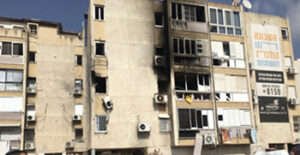
We stop in Ashkelon to view an apartment building which had been hit by a rocket. It is surreal. The commander asks a couple of us, from different parts of the US, how we’d handle this as the first-in incident commander (IC). They are interested in our tactics and strategy, as we are of theirs. The difference is that we represent a variety of separate fire departments from across America, often operating in dissimilar ways, while the Israel Fire Authority is a national fire department. While there, the lead officer reminds us that if a red alert siren goes off, we should run away from buildings, fire engines, and cars, try to get behind a wall, and lay face down with our hands over the back of our necks. For practice, he issues the command, and we scatter and run, hopping over a low wall. A few minutes later, right on cue, a real siren goes off. We drive through Sderot, but we can’t stop as he explains it’s still “too hot.” As we drive past it, I take a picture of an empty lot which he says was until recently a large headquarters police station. Terrorists had stormed it on October 7, killing many police officers. The IDF, after determining that the gunmen had no hostages, demolished the building, with considerable difficulty. There wasn’t a trace of it left.
A senior firefighter in Ashkelon sacrificed his life jumping on a grenade saving two of his sons. That’s another story, related to me by an American firefighter from St. Louis who went with the crew of his station to visit the surviving wife and sons in the hospital. While we were there in the station with the crew, another siren went off and we had to run down stairs to an underground mamad (quickly, as the time you have in seconds is shorter the closer you are to Gaza, and we were very close).
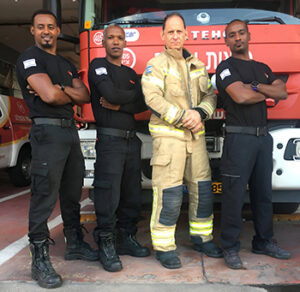
The next stop is a fake grass field under tents where lunch is being served to IDF troops who are getting ready to enter Gaza. One of the firefighters, from Florida, yells, “Israel, America loves you!” and cheers from the soldiers go up. Soon we’re headed back to the academy. Later, I’m on my way to the cafeteria, holding the door for an Israeli firefighter, who says “thanks.” I detect no accent, and ask, “are you American?” “No,” he says, in perfect English, “I’m born and raised in Israel, we’re Black Hebrews.” We talk for a bit, I ask him when he expects to graduate, and he replies December 31, “if I make it.” The fire academy in Israel is military-style, four months living on site. (We stayed in touch; he sent me pictures from his graduation). Later that evening a group of us who had been in-country were taken to the airport to fly home on El Al. Ben Gurion was empty, I’ve never seen anything like it, we walked right up to the security agents. There is no line of Israelis leaving their country during war.
Postscript — It’s taken me a while to decompress. I kept hearing sirens here in La Jolla; really just vehicle engines accelerating. I’d look around to see which direction people were running to the shelter; they weren’t. I’d jump at the sound of an Iron Dome interception; just a door slamming or car backfiring. I can’t imagine what it’s like for real soldiers to exit a real combat zone. My cousin and some friends entered Gaza early in the war, and I was spending time, probably too much, reading articles, listening to online briefings, talking on the phone to Israel. I still keep up every day though; praying for the release of all hostages, and the destruction of these enemies, truly the most evil people in world history. I want to go back to volunteer in Israel doing something meaningful, anything, even if it’s just picking produce. Am Yisrael Chai!
*
Editor’s Note: In addition to being a retired Santee firefighter, Dana Ben Kaplan is a teacher of Krav Maga, the Israeli form of martial arts.